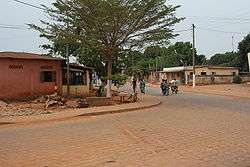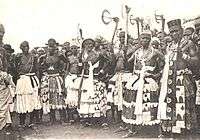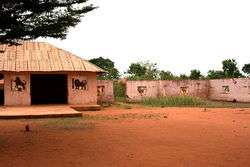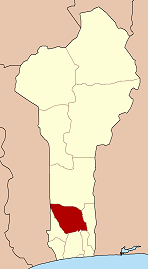Abomey
| Abomey | |
|---|---|
| Commune and city | |
 | |
 Abomey Location in Benin | |
| Coordinates: 7°11′8″N 1°59′17″E / 7.18556°N 1.98806°ECoordinates: 7°11′8″N 1°59′17″E / 7.18556°N 1.98806°E | |
| Country |
|
| Department | Zou Department |
| Area | |
| • Total | 142 km2 (55 sq mi) |
| Elevation | 221 m (725 ft) |
| Population (2012) | |
| • Total | 90,195 |
| • Density | 640/km2 (1,600/sq mi) |
| Time zone | WAT (UTC+1) |
Abomey is a city in the Zou Department of Benin. Abomey is also the former capital of the ancient Kingdom of Dahomey (c. 1600–1904), which would later become a French colony, then the Republic of Dahomey (1960–1975), and is the modern-day Republic of Benin.
Abomey houses the Royal Palaces of Abomey, a collection of small traditional houses that were inhabited by the Kings of Dahomey from 1600 to 1900, and which were designated a World Heritage Site by UNESCO in 1985.
The commune of Abomey covers an area of 142 square kilometres and as of 2012 had a population of 90,195 people.[1][2]
The Royal Palaces of Abomey
The Royal Palaces of Abomey are a group of earthen structures built by the Fon people between the mid-17th and late 19th Centuries. One of the most famous and historically significant traditional sites in West Africa, the palaces form one of the UNESCO World Heritage Sites.
The town was surrounded by a mud wall with a circumference estimated at six miles, pierced by six gates, and protected by a ditch five feet deep, filled with a dense growth of prickly acacia, the usual defence of West African strongholds. Within the walls were villages separated by fields, several royal palaces, a market-place and a large square containing the barracks. In November 1892, Béhanzin, the last independent reigning king of Dahomey, being defeated by French colonial forces, set fire to Abomey and fled northward.[3] The French colonial administration rebuilt the town and connected it with the coast by a railroad.
| Royal Palaces of Abomey | |
|---|---|
| Name as inscribed on the World Heritage List | |
| Type | Cultural |
| Criteria | iii, iv |
| Reference | 323 |
| UNESCO region | Africa |
| Inscription history | |
| Inscription | 1985 (9th Session) |
| Endangered | 1985–2007 |
When UNESCO designated the royal palaces of Abomey as a World Heritage Site in 1985 it stated
- From 1625 to 1900 twelve kings succeeded one another at the head of the powerful Kingdom of Abomey. With the exception of King Akaba, who used a separate enclosure, they each had their palaces built within the same cob-wall area, in keeping with previous palaces as regards the use of space and materials. The royal palaces of Abomey are a unique reminder of this vanished kingdom.
From 1993, 50 of the 56 bas-reliefs that formerly decorated the walls of King Glèlè (now termed the 'Salle des Bijoux') have been located and replaced on the rebuilt structure. The bas-reliefs carry an iconographic program expressing the history and power of the Fon people.
Today, the city is of less importance, but is still popular with tourists and as a centre for crafts.
Threats
As reported by UNESCO, the Royal Palaces of Abomey suffered from a fire on 21 January 2009 "which destroyed several buildings."[4] The fire was the most recent disaster which has plagued the site, coming after a powerful tornado damaged the site in 1984.[5]
Demographics
| Year | Population[6] |
|---|---|
| 1860s | 24 000 |
| 1979 | 38 412 |
| 1992 | 65 725 |
| 2002 | 77 997 |
| 2008 (estimate) | 87 344 |
Gallery
-

"Important witchdoctors" (1908)
-
._-_Dance_of_the_Fon_chiefs.jpg)
Dance of the Fon chiefs 1908
-

Young girl with wooden statue of mystic chair (1908)
-

Abomey in 2006
-

One of the royal palaces.
See also
References
- ↑ "Abomey". Atlas Monographique des Communes du Benin. Retrieved January 5, 2010.
- ↑ "Communes of Benin". Statoids. Archived from the original on 2 January 2010. Retrieved January 5, 2010.
- ↑
 One or more of the preceding sentences incorporates text from a publication now in the public domain: Chisholm, Hugh, ed. (1911). "Abomey". Encyclopædia Britannica. 1 (11th ed.). Cambridge University Press. p. 67.
One or more of the preceding sentences incorporates text from a publication now in the public domain: Chisholm, Hugh, ed. (1911). "Abomey". Encyclopædia Britannica. 1 (11th ed.). Cambridge University Press. p. 67. - ↑ UNESCO World Heritage news, 13 February 2009
- ↑ "State of Conservation: Royal Palaces of Abomey (Benin)". UNESCO. Retrieved 27 July 2015.
- ↑ "Abomey". World Gazetteer. Retrieved 2008-12-19.
External links
| Wikivoyage has a travel guide for Abomey. |
| Wikimedia Commons has media related to Abomey. |
| Wikisource has the text of the 1921 Collier's Encyclopedia article Abomey. |


